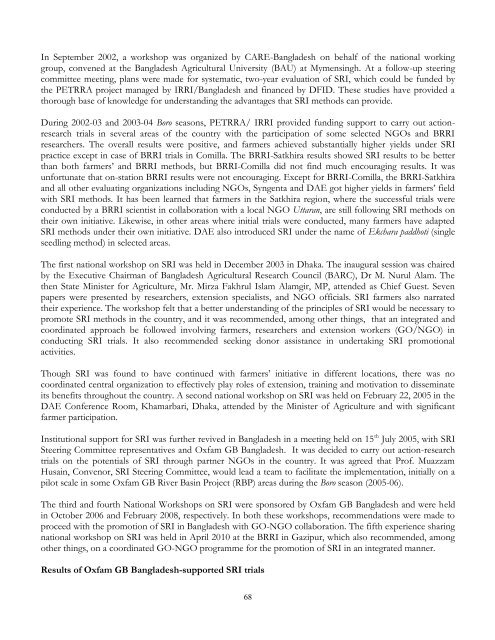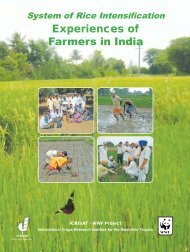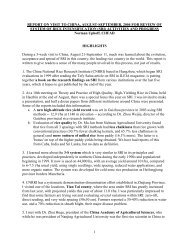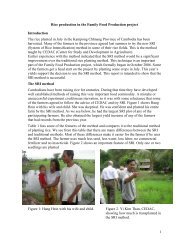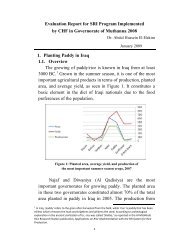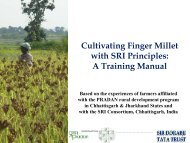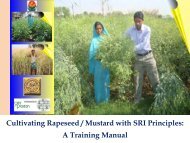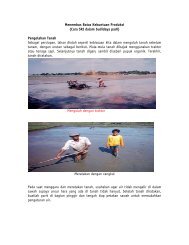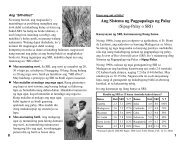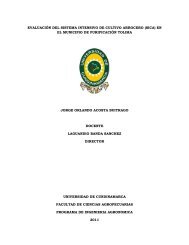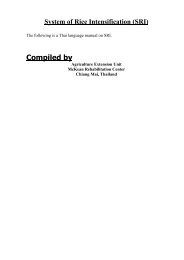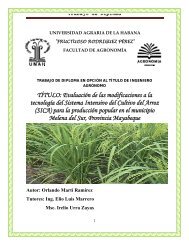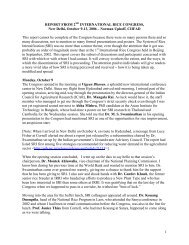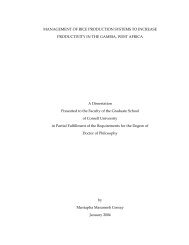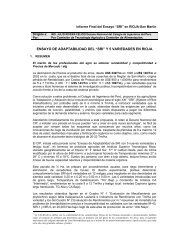Revised proceedings - The System of Rice Intensification - Cornell ...
Revised proceedings - The System of Rice Intensification - Cornell ...
Revised proceedings - The System of Rice Intensification - Cornell ...
Create successful ePaper yourself
Turn your PDF publications into a flip-book with our unique Google optimized e-Paper software.
In September 2002, a workshop was organized by CARE-Bangladesh on behalf <strong>of</strong> the national working<br />
group, convened at the Bangladesh Agricultural University (BAU) at Mymensingh. At a follow-up steering<br />
committee meeting, plans were made for systematic, two-year evaluation <strong>of</strong> SRI, which could be funded by<br />
the PETRRA project managed by IRRI/Bangladesh and financed by DFID. <strong>The</strong>se studies have provided a<br />
thorough base <strong>of</strong> knowledge for understanding the advantages that SRI methods can provide.<br />
During 2002-03 and 2003-04 Boro seasons, PETRRA/ IRRI provided funding support to carry out actionresearch<br />
trials in several areas <strong>of</strong> the country with the participation <strong>of</strong> some selected NGOs and BRRI<br />
researchers. <strong>The</strong> overall results were positive, and farmers achieved substantially higher yields under SRI<br />
practice except in case <strong>of</strong> BRRI trials in Comilla. <strong>The</strong> BRRI-Satkhira results showed SRI results to be better<br />
than both farmers‟ and BRRI methods, but BRRI-Comilla did not find much encouraging results. It was<br />
unfortunate that on-station BRRI results were not encouraging. Except for BRRI-Comilla, the BRRI-Satkhira<br />
and all other evaluating organizations including NGOs, Syngenta and DAE got higher yields in farmers‟ field<br />
with SRI methods. It has been learned that farmers in the Satkhira region, where the successful trials were<br />
conducted by a BRRI scientist in collaboration with a local NGO Uttaran, are still following SRI methods on<br />
their own initiative. Likewise, in other areas where initial trials were conducted, many farmers have adapted<br />
SRI methods under their own initiative. DAE also introduced SRI under the name <strong>of</strong> Ekchara paddhoti (single<br />
seedling method) in selected areas.<br />
<strong>The</strong> first national workshop on SRI was held in December 2003 in Dhaka. <strong>The</strong> inaugural session was chaired<br />
by the Executive Chairman <strong>of</strong> Bangladesh Agricultural Research Council (BARC), Dr M. Nurul Alam. <strong>The</strong><br />
then State Minister for Agriculture, Mr. Mirza Fakhrul Islam Alamgir, MP, attended as Chief Guest. Seven<br />
papers were presented by researchers, extension specialists, and NGO <strong>of</strong>ficials. SRI farmers also narrated<br />
their experience. <strong>The</strong> workshop felt that a better understanding <strong>of</strong> the principles <strong>of</strong> SRI would be necessary to<br />
promote SRI methods in the country, and it was recommended, among other things, that an integrated and<br />
coordinated approach be followed involving farmers, researchers and extension workers (GO/NGO) in<br />
conducting SRI trials. It also recommended seeking donor assistance in undertaking SRI promotional<br />
activities.<br />
Though SRI was found to have continued with farmers‟ initiative in different locations, there was no<br />
coordinated central organization to effectively play roles <strong>of</strong> extension, training and motivation to disseminate<br />
its benefits throughout the country. A second national workshop on SRI was held on February 22, 2005 in the<br />
DAE Conference Room, Khamarbari, Dhaka, attended by the Minister <strong>of</strong> Agriculture and with significant<br />
farmer participation.<br />
Institutional support for SRI was further revived in Bangladesh in a meeting held on 15 th July 2005, with SRI<br />
Steering Committee representatives and Oxfam GB Bangladesh. It was decided to carry out action-research<br />
trials on the potentials <strong>of</strong> SRI through partner NGOs in the country. It was agreed that Pr<strong>of</strong>. Muazzam<br />
Husain, Convenor, SRI Steering Committee, would lead a team to facilitate the implementation, initially on a<br />
pilot scale in some Oxfam GB River Basin Project (RBP) areas during the Boro season (2005-06).<br />
<strong>The</strong> third and fourth National Workshops on SRI were sponsored by Oxfam GB Bangladesh and were held<br />
in October 2006 and February 2008, respectively. In both these workshops, recommendations were made to<br />
proceed with the promotion <strong>of</strong> SRI in Bangladesh with GO-NGO collaboration. <strong>The</strong> fifth experience sharing<br />
national workshop on SRI was held in April 2010 at the BRRI in Gazipur, which also recommended, among<br />
other things, on a coordinated GO-NGO programme for the promotion <strong>of</strong> SRI in an integrated manner.<br />
Results <strong>of</strong> Oxfam GB Bangladesh-supported SRI trials<br />
68


